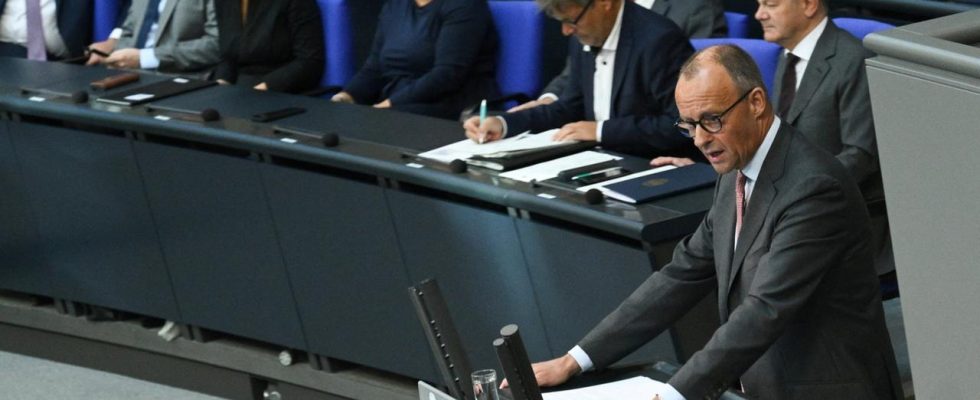The general debate is seen as the opposition’s finest hour. It is time to settle accounts with the government and this is where the alternatives should become clear. But it’s not just the government that disagrees.
It was a poisoned offer. “To good cooperation,” said Union leader Friedrich Merz in the direction of Finance Minister Christian Lindner. According to Merz, there are now two opposition leaders. One in parliament – that is, himself – and with the head of the FDP another in the government. Lindner didn’t even hear that because he was late today.
The leader of the opposition traditionally opens the general debate. His message: Those in government just argue. So Merz begins almost statesmanlike. He speaks of the turning point – a term that Chancellor Olaf Scholz coined after Russia’s attack on Ukraine. Merz says: “The whole dimension of the turning point in time caused by the war will only become visible after the war.”
The CDU leader accuses the federal government that the budget does not do justice to this turning point, the Bundeswehr, for example, is still an unloved child. Merz announces that it will stop laws should the Union govern again – above all the heating law. He shoots at citizen money and demands that performance should be worthwhile again.
And he criticizes the climate policy of the federal government. The majority of the people in the country no longer support it. “Because people are just tired of only being confronted with bans, regulations with incalculable costs and bureaucratic requirements. If you want to damage the climate, then you have to do it exactly as you are currently doing it.” Now it’s getting louder in the hall and Merz no longer sounds like the statesman. His tone gets rough.
With whom would Merz coalition?
In the beer tent it became even clearer on Monday. At Gillamoos in Abensberg, Lower Bavaria, he shot particularly against the Greens, his main opponent in the federal government. “These Greens cannot be a coalition partner for the Union if they deny reality, as they do in particular on immigration policy and internal security.”
Statements like these are not a particularly smart strategy, says political scientist Sabine Kropp from the Free University in Berlin. In doing so, he is blocking opportunities to form coalitions – for example with the Greens at state level. Given the weakness of the FDP, the Union would then be dependent on the SPD. That would mean that if the Union wanted to govern again, there would only be a new version of the unpopular grand coalition.
Opposition without a strategy?
What does the opposition stand for? With whom does she want to implement the goals? In addition to the Union, AfD and Linke sit on the opposition benches. The Union has ruled out cooperation with both parties.
Political scientist Kropp analyzes that not only the government is at odds, but also the opposition. Voters are having increasing difficulty identifying an alternative to current government policies. “What we’ve been observing more and more over the past few weeks and months is that populist extreme parties are benefiting from this, because trust is increasingly being damaged not only in the incumbent government, but also in democratic institutions,” said Kropp.
This can be seen in the current AfD polls. The right-wing extremist party can hardly walk with strength at the moment. Although she has been in the Bundestag for years, the other parties lack a clear strategy. Today they choose to listen away. When faction leader Tino Chrupalla speaks, the hall visibly empties. Ministers read files or type on their cell phones. Union leader Merz walks through the hall and holds talks.
AfD: Willing to compromise without power option
The AfD boss says the government can thank them for clearly naming the AfD’s mistakes. He accuses the Chancellor of being disconnected from the reality of life. “They live in an illusory world that has traits from the last days of the People’s Chamber in the GDR.”
The AfD recently presented a ten-point program. She outlines her policies, which she would implement if she were to lead a federal government. Since that is unrealistic, it is also easy for the party to generously announce compromises. The AfD itself knows that nobody wants to work with them at the federal level any time soon.
Linke continues to fight for survival
The opposition also includes a party that describes itself as a medical emergency. The left is fighting for its own survival. Group leader Dietmar Bartsch had recently spoken of a stable lateral position. For months, Sahra Wagenknecht has been flirting with founding her own party. Even if she is usually absent from the Bundestag, she determines the fate of the left in the Bundestag.
It almost goes unnoticed that faction leader Amira Mohamed Ali accuses the federal government of “crazy” work and says that the government is spending many times more on the military than on basic child security.
Chancellor Scholz had to yield to the leader of the opposition today. Only then does he speak and attack Friedrich Merz directly. He speaks of a “boom” that the CDU leader is performing. Of not doing justice to the seriousness of the situation. And then proposes a “Germany Pact” to modernize the country, make it faster and safer.
Merz himself can no longer react directly to this, which is done by CSU regional group leader Alexander Dobrindt. The proposal shows that the traffic light no longer has its own majority on key issues. The Union would be available if the coalition failed. Only then the “refugee crisis” would have to be discussed first.

